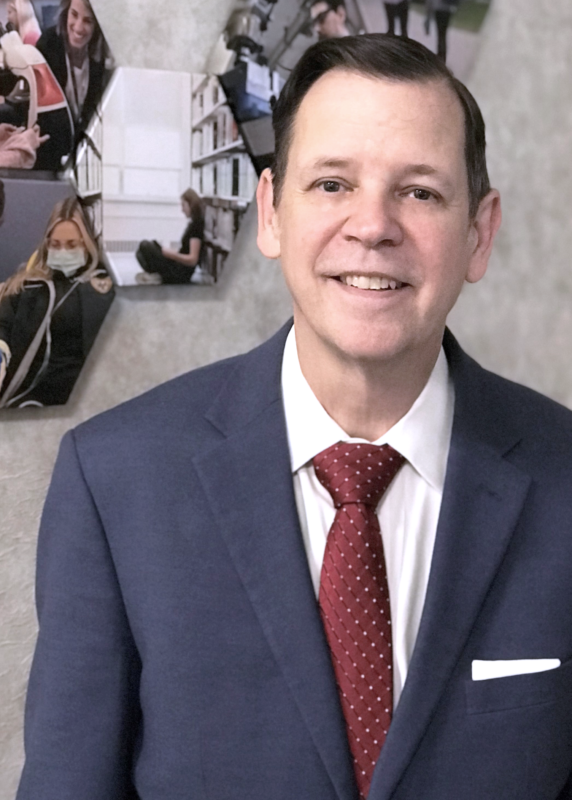A discussion with NHTI’s new president
Dr. Patrick Tompkins, the President of NHTI since February, shared his thoughts on the role of community colleges, the challenges of declining enrollment, strategies to ensure high-quality education at an affordable cost and more.
Tell us about yourself and what drew you to NHTI.
I’ve been working in higher education for several decades … in Iowa, Oklahoma, Virginia and now New Hampshire. I was an English professor for a long time, and then … moved into administration. I was a dean and a provost at a college, then went to Eastern Shore Community College and served as vice president of academics, students and workforce education. I came to NHTI primarily because of the quality of the college and what it has to offer. We have really solid programs in things like health care … and we have some really unique programs, like mindfulness, hospitality, sports management and addiction counseling. … I also really wanted to work at a community college that has an athletics program, because I believe it provides academic opportunity for some students who might not otherwise [attend college].
What do you believe is the role of community college?
I call community college the greatest democratization in the history of higher education. It makes post-secondary education accessible to all. It’s affordable. It’s convenient. There’s a community college within driving distance of everybody in the continental United States. It allows people who may not think they’re right for higher education or who would otherwise not be able to get into higher education to get an education in a wide variety of fields.
How will you work to ensure an education at NHTI is both affordable and high quality?
The state legislature has allowed the community college system to keep tuition only $5 ahead of where it was in 2011. … Even though the tuition [cost] has stayed constant, there is still a gap that is hard for students to fill. That’s where I have to expand our scholarships. … When we’re able to provide scholarships to cover ancillary things, such as books or supplies, that helps to close that gap. … Most folks know we’re inexpensive; we’re less than half the cost of any other college in New Hampshire … but that means nothing if we don’t have quality. … Our quality comes from having superior faculty whose only mission is to teach. … We have programs that can be completed in a short term … and with flexible scheduling … that lead to really good jobs. … We have a campus with wonderful amenities and extracurricular activities. … These are all things that are of value to our students.
What do extracurricular activities, athletics and campus life contribute to the educational experience at NHTI?
We serve the entire student. It’s not just about academics; it’s also about helping them develop as good family members, community members and workers, and to live healthy lives, mentally and physically. … Having the dorms and a mix of student clubs and activities makes for a really rich campus life. Many community colleges don’t have athletics, so I’m really happy that we do. … For some students, athletics may be the thing that draws them in, and once they’re here they start to realize that sports is not going to pay their way and that they’re going to need [job] skills. … Not all students will go pro in their sport, but they are still passionate about it, and being able to play at the college level is an exciting thing for them.
Enrollment in community colleges has been declining. How do you plan to address that at NHTI?
Declining enrollment is a national trend that’s been going on since 2014. The two primary factors are, there have been fewer people graduating high school … and the people who want to work have found work and aren’t in immediate need of training. It’s looking like we’re nearing [the end] of declining enrollment, and that those factors — particularly the second one — are going to change. There are going to be more opportunities for people to change career fields or advance in the field they’re in and [therefore] come back to college. … But should growing enrollment always be the goal? I think the better question to ask is, how well is a community college serving its community? Because enrollment [reflects whether] we are offering the right mix of programs that are relevant to [employment] opportunities for residents in the area. … So our focus is on our programs and looking at where there are new opportunities or opportunities to grow.
What do you find most fulfilling about this position?
It helps me live out a very foundational ethic that was bred in me as a young person, which is my commitment to service for others into the community. … I feel fortunate to have a job where it’s not about me. People in our business sometimes say, ‘Your success is our success.’ I don’t view it that way. I view it as your success is your success; I was just lucky enough to be there as you were achieving it.
Featured photo: Dr. Patrick Tompkins. Courtesy photo.






